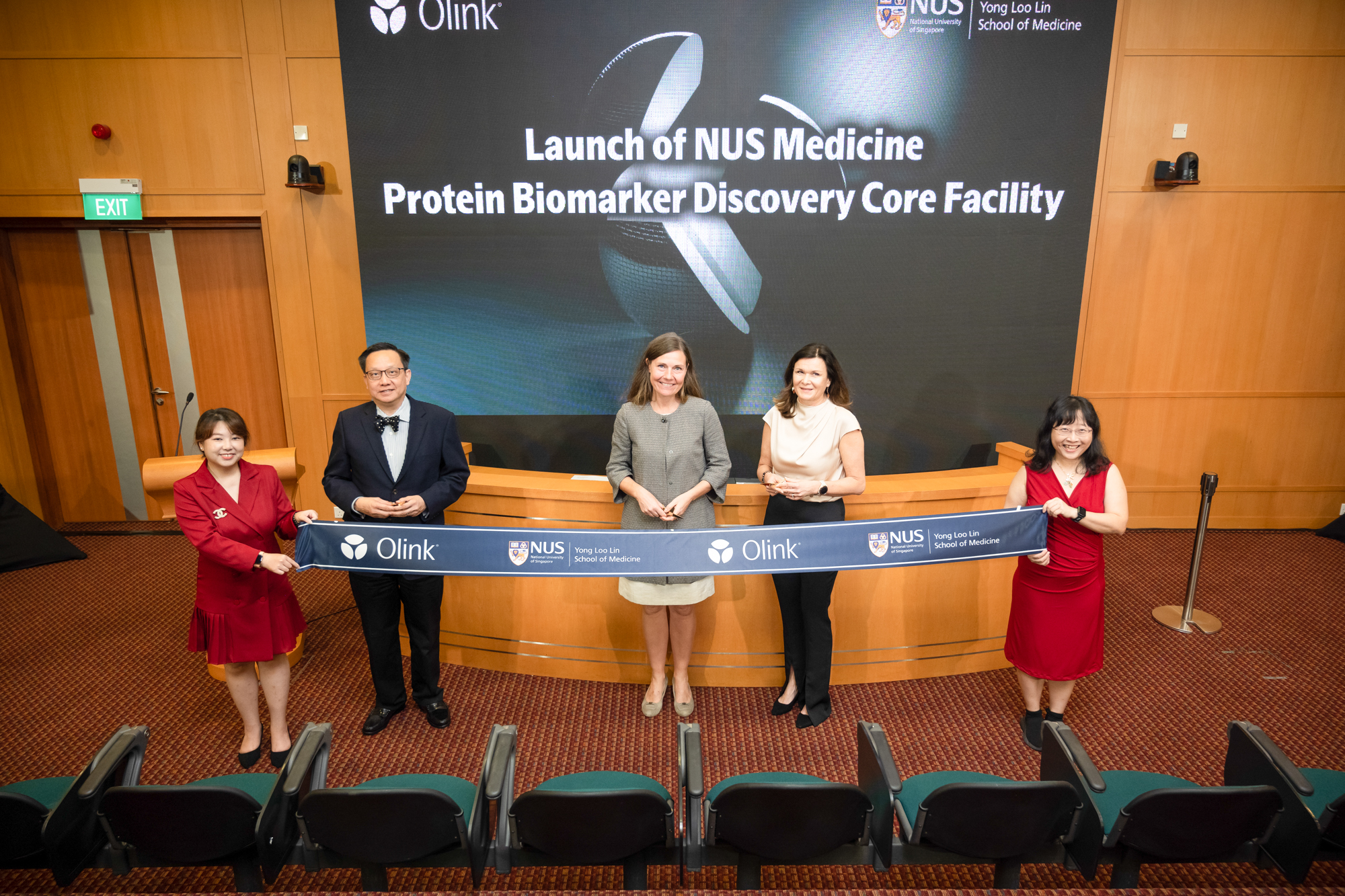NUS Medicine Implements Olink Technology to Accelerate Precision Medicine through Next-Generation Proteomics
Published: 07 Mar 2023

From left to right:
Wen Jing Sim, Business Development Manager, Olink Proteomics, Professor Chong Yap Seng, Dean, NUS Yong Loo Lin School of Medicine, Jenny Egermark, Chargé d’Affaires a.i. at Embassy of Sweden, Andrea Ballagi MD., PhD, MBA, VP Sales and Marketing APAC, Olink Proteomics, Teng Teng Loke, Sales Operations Manager, Olink Proteomics
The Yong Loo Lin School of Medicine, National University of Singapore (NUS Medicine) has launched the NUS Medicine Protein Biomarker Discovery Core Facility, which will provide the Olink® Explore 3072, Olink® Explore 1536, Olink® Target 96 and Target 48, and the recently launched Olink® Flex platforms. These solutions for advanced protein biomarker research range from high-plex, high throughput discovery to more targeted biomarker studies. The launch of this core facility at NUS Medicine strengthens Olink’s presence in the South Asia Pacific region, offering its highly innovative proteomics technologies to a wider audience.
The Olink technology allows for high throughput screening and detection of large numbers of proteins in small amounts of biological samples, such as blood plasma and saliva, which could potentially be protein biomarkers for disease. Based at NUS Medicine, the core facility will support researchers and scientists from NUS and the industry, both locally and globally in their understanding of disease, as well as the effects and outcomes of treatment. This also empowers pharmaceutical companies to better understand the mode of action and dose selection of new drugs, and to follow up on their clinical trials.
“With the NUS Medicine Protein Biomarker Discovery Core Facility we can support the local and regional research communities and empower researchers to seek a more comprehensive understanding of the biology and the pathophysiology of a disease. We welcome Olink as our primary proteomics partner in Singapore – their cutting-edge technology will provide detailed and comprehensive proteomics data covering all major biological pathways and processes,” said Prof Chong Yap Seng, Lien Ying Chow Professor in Medicine, Dean, NUS Medicine.
Another focus of the Facility will be support of population health studies, which are gaining interest and attraction from the pharmaceutical industry globally. Singapore is uniquely placed with its diverse ethnicities and highly developed research infrastructure, as well as widespread global collaborations. The core facility will be utilising the Olink technology for a broad range of projects in the fields of heart failure, stroke, diabetes, healthy ageing, mother and child, cancer and infectious disease, as well as in large cohort studies. The technology will enhance patient stratification, better diagnosis and disease management, and supports novel drug development with the prospect of new tests and treatments which will benefit Singapore.
“This relationship between Olink and the prestigious Yong Loo Lin School of Medicine, National University of Singapore, demonstrates our efforts to invest in this part of Asia, focusing on technology and knowledge transfer to the Singaporean scientific community,” said Andrea Ballagi, MD, PhD, Vice-President Sales and Marketing Asia and Pacific Region, Olink Proteomics. “There is an unmet need for population health research based on a more local and diverse ethnicity. We are convinced that using our platforms will fundamentally help local research teams to meet their goals more effectively, accelerating research in areas such as the understanding of disease, more efficient and safer drug development, and enablement of earlier and more accurate diagnoses of disease.”

